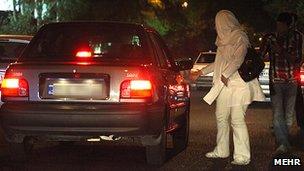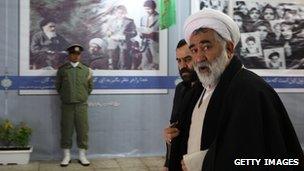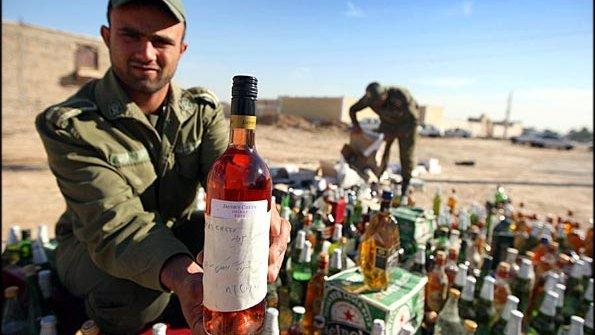Iran sets sights on tackling prostitution
- Published

Officials hope to persuade sex workers to reform
Authorities in Iran have announced plans to tackle prostitution, shining a light on a taboo subject and profession treated as a crime in the religiously conservative country.
It is not common for Iranian officials to admit to the existence of prostitution. Usually, this type of social issue is portrayed as a Western plot to create a cultural metamorphosis in society and corrupt Iranian youth.
Tehran's pre-revolution red light district of Shahr-e Now (New Town) was demolished after the 1979 Islamic revolution, prompting prostitutes to move on to the streets to ply their trade.
The latest move is an acknowledgment by the authorities of the extent of the problem.
One of the plans in the pipeline is called "Special Women".
"We are planning to provide the necessary education to these people so that they do not fall prey to those who intend to take advantage of them," said Mohammad Ali Erfanmanesh, a senior Tehran provincial official.
"In this context, we intend to involve various cultural, social, police, judicial and security bodies."
In another move, the Interior Ministry said it is planning to set up a camp for "street women" at the Jajrud region, north-east of Tehran.
According to the governor general of Tehran, Morteza Tamaddon, the camp will not be a prison, but a place where prostitutes "can come to an understanding of their problem and reform themselves spontaneously".
Call for rethink
Habibollah Masudi-Farid, of Iran's Social Welfare Organisation (SWO), a government-run body, has called for a more realistic approach to dealing with the issue.
"The Social Welfare Organisation must take a more active approach towards women and sexual workers. Many need to receive help and contraceptives from the Social Welfare Organisation. But because prostitution is an offence, they do not call on the organisation to ask for help."

Iran often blames social problems, including prostitution, on the West
He has also said that policy makers in Iran are reluctant to provide even the minimum funding needed to help prostitutes leave the profession because "they wrongly assume that prostitutes are to blame for the problems they face".
Iranian sociologists often rely on unconfirmed statistics provided by low-ranking officials. This type of information - such as a recent statement that said prostitutes were starting out younger - occasionally appear in the media, which refer to prostitutes as "street women", "special women" or "runaway girls".
"Certain statistics have no positive function in society; instead, they have a negative psychological impact. It is better not to talk about them," said the head of the SWO, Homayun Hashemi.
Available figures show the two provinces of Tehran and Iran's north-eastern province of Khorasan Razavi, have the highest number of "street women".
Other figures suggest that 10%-12% of prostitutes are married women in their early to late 20s.
According to Masudi-Farid, the age of entry into prostitution has fallen in recent years.
He said the average age of prostitutes decreased by one year in 2010 and 2011.
Unconfirmed studies show that the age of entry into prostitution has fallen to 14.
The growing number of minors who turn to prostitution are reportedly victims of domestic violence, poverty, unemployment and pre-arranged marriages, as well as divorce.
Prostitution is not limited to women in contemporary Iran. According to a recent report on the news website Baztab-e Emruz, a growing number of male prostitutes can be found in sport facilities and recreational centres in wealthy districts in north and north-west Tehran.
The report said these men are sought by both middle-aged wealthy women, as well as young and educated women, looking for short-term sexual relationships.
'Cyber' prostitution
According to a report by news and analysis website Ghanoon, "cyber" prostitution is becoming increasingly popular in Iran, especially among the young, internet-savvy generation.
It said 55% of "cyber prostitutes" are aged 16 to 25.
The report warned that a growing number of young Iranians, including in small towns, were using the internet for prostitution.
Using anonymity and fake identities, cyber prostitutes are active in chat-rooms, where they offer visual and verbal services. Most charge their clients before making their services available.
Others use cyberspace mainly to find customers and avoid the usual threats that street prostitutes might face.
In a report on Tabnak news website, it was said that not all prostitutes turned to the profession out of penury. According to the report, a number of female prostitutes "with beautiful bodies and faces" had turned the job into very profitable businesses.
These prostitutes lead very expensive lifestyles and offer their services to an extremely wealthy clientele, it said. They live in smart neighbourhoods, receive jewellery from clients, are often fluent in English and are sometimes taken by their customers on trips abroad.
BBC Monitoring, external selects and translates news from radio, television, press, news agencies and the internet from 150 countries in more than 70 languages. It is based in Caversham, UK, and has several bureaux abroad. For more reports from BBC Monitoring, click here
- Published20 June 2012

- Published14 October 2024
